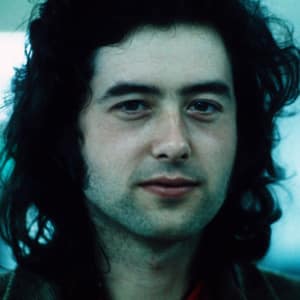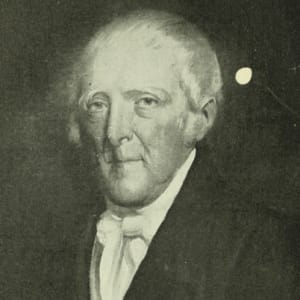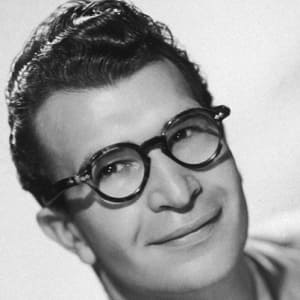
Jimmy Page
Musician, songwriter and producer Jimmy Page was in the Yardbirds and founded the British rock band sensation Led Zeppelin in the late 1960s.
Synopsis
Jimmy Page was born January 9, 1944, in Heston, England. In 1965, he was asked to join the Yardbirds. In 1968 he formed a new band, renamed Led Zeppelin. The band toured the United States and released their first album, Led Zeppelin I, in 1969. Led Zeppelin soon developed a strong following. In addition to their recordings, Led Zeppelin was one of the most successful live acts of the 1970s.
The Yardbirds
Musician, songwriter, producer. Born James Patrick Page on January 9, 1944, in Heston, England. He was inspired by rock star Elvis Presley's "Baby Let's Play House" to take up the guitar at the age of 13. As a teenager, Page joined his first band, Neil Christian & the Crusaders. He toured with the group for a time, but he had to leave after suffering from a glandular fever.
After a stint at art school, Page returned to music. He then became a session musician and a producer, working in England's thriving rock scene with such acts as the Rolling Stones, the Kinks, and the Who. In 1965, Page was asked to join the Yardbirds, a blues-influenced rock band, which had just scored a big hit with "For Your Love." The band wanted him to take over for Eric Clapton, who left the group for John Mayall's Bluebreakers. Page turned them down and recommended fellow session musician and legendary guitarist-in-the-making Jeff Beck. The Yardbirds sought out Page again the following year, and he finally agreed to become a band member.
For a short period of time, the Yardbirds had two lead guitarists, Page and Beck. Beck left in late 1966 because ill health and a possible nervous breakdown. After Beck's departure, the Yardbirds released Little Games (1967), but they could not match their earlier success. The band fizzled out in 1968, and Page formed a new band to play some remaining Yardbirds concert dates. Initially calling themselves the New Yardbirds, the band consisted of John Paul Jones on bass and keyboards, John "Bonzo" Bonham on drums, and Robert Plant on lead vocals.
Led Zeppelin
Quickly renaming themselves Led Zeppelin, the band toured the United States as the opening act for the American rock group Vanilla Fudge. They released their first album, Led Zeppelin I in 1969, which earned mixed reviews. As John Mendelsohn wrote in Rolling Stone magazine, "Jimmy Page, around whom the Zeppelin revolves, is, admittedly, an extraordinarily proficient blues guitarist and explorer of his instrument's electronic capabilities. Unfortunately, he is also a very limited producer and a writer of weak, unimaginative songs, and the Zeppelin album suffers from his having both produced it and written most of it (alone or in combination with his accomplices in the group)." While critics may not have been thrilled by their work, music fans enjoyed such tracks as the now classic "Dazed and Confused." Their songs showcased Page's skills as a musician, often featuring his intense guitar riffs.
Led Zeppelin soon developed a strong following. Music fans really enjoyed the band's hard rock and heavy metal sound. Their second album, the aptly titled Led Zeppelin II (1969), featured "Whole Lotta Love," "Ramble On," and "Heartbreaker." "Whole Lotta Love" reached the No. 4 spot on the pop charts, and the album reached the top of the charts by year's end. Again, Page worked behind the scenes, serving as producer for the recording. He also wrote or helped to write the music for many of the band's songs while Plant served as the group's main lyricist.
In 1970, Led Zeppelin released the more folk-influenced Led Zeppelin III. The single, "Immigrant Song," became the band's latest hit. Many critics saw the group's fourth album, however, as their best work. This 1971 untitled work is sometimes called the Runes Album for the symbols on the cover, which reflected Page's interest in the occult. The album offered listeners such songs as the legendary "Stairway to Heaven," which became one of most requested rock songs of all time despite its startling 8-minute length. "Black Dog" and "Rock and Roll" were other significant tracks from that album.
Ups and Downs
With 1973's Houses of the Holy, Led Zeppelin continued its domination of the rock world. The album went to the top of the charts and featured the hit "D'yer Mak'er." The band launched their own record label, Swan Song Records, in 1974, and worked with such acts as Bad Company.
The following year, Page and the rest of the group enjoyed great success with the double album Physical Graffiti. The recording contained such hits as "Trampled Underfoot." That August, however, the band was forced to take a break as Plant recovered from injuries sustained in a car accident. Their next effort, 1976's Presence, proved to be a disappointment.
In addition to their recordings, Led Zeppelin was one of the most successful live acts of the 1970s. Some of their performances were captured in the 1976 concert film The Song Remains the Same. Off stage, they became infamous for their excessive lifestyles, which led to the group's downfall. Bonham died at Page's house outside London in September 1980. After doing some heavy drinking, Bonham choked to death on his own vomit. Losing Bonham affected Page deeply—he couldn't play music for months after the incident. The rest of the band had similar feelings, and they decided that Led Zeppelin could not continue without Bonham.
Reuniting
Returning to music as a composer, Page penned the score to the Charles Bronson film Deathwish II (1982). In 1984, he formed a group called the Firm with Paul Rodgers, formerly of Bad Company and Free. Page was also arrested that year for drug possession. The Firm released a self-titled album in 1985, which did well commercially but earned lackluster reviews. Their next effort, 1986's Mean Business, did not fare as well.
Page reunited with John Paul Jones and Robert Plant in 1985 to play the international benefit concert Live Aid. They were joined on stage by drummers Tony Thompson and Phil Collins. They played together again in 1988 for the special concert held in honor of Atlantic Records 25th anniversary. This time, however, Jason Bonham, son of the late John Bonham, filled in on drums.
That same year, Page released his solo debut, Outrider, which featured Robert Plant and drummer Jason Bonham. He returned the favor by working on Plant's own effort, Now and Zen. Page's next album was a collaboration with former Whitesnake and Deep Purple vocalist David Coverdale. Coverdale/Page was released in 1993 to little notice.
In 1994, Page reunited with Plant for No Quarter: Jimmy Page and Robert Plant Unledded to recreate Led Zeppelin classics as acoustic works. They also recorded a few new songs for this project, which consisted of a television special and an album. The pair also went on tour together in 1995. That same year, Led Zeppelin was inducted into the Rock and Rock Hall of Fame.
Page and Plant worked together again on 1998's Walking Into Clarksdale. The album was critically well-received. "Plant's Moroccan-blues swagger and Page's unmistakable, scruffy-smart guitar touch come together beautifully," raved Entertainment Weekly . They won a Grammy Award for Best Hard Rock Performance for "Most High."
Charity and Impact
Page then teamed up with The Black Crowes in 1999 for a concert in England that led to a highly praised U.S. tour with the band. The concerts were produced into a live album called Live at the Greek the following year. He planned on touring with the Black Crowes that year, but he had to back out after hurting his back.
In 2005, Page received an important honor for his charitable work. Queen Elizabeth II made him an Officer of the Order of the British Empire for helping to found Action for Brazil's Children Trust. The charity, established by Page and his second wife Jimena, also operates a shelter for street children called Casa Jimmy. The trust also supports local Brazilian organizations that provide education and other assistance to kids in need.
Returning to music, Page helped revive Led Zeppelin in 2007 for a special benefit show for the Ahmet Ertegun Education Fund, named for the late co-founder of Atlantic Records. Tickets sold out quickly for the first appearance of Led Zeppelin in 19 years (with Jason Bonham again filling in for his late father on drums). The concert was held on December 10 at London's O2 Arena, and it proved to be a triumphant return for the famous 70s supergroup. Critics raved about their show, which lasted more than two hours. Rolling Stone had high praise for Page, writing he "was a continual shock on guitar, mostly because he has played so little in public for the past decade. At sixty-three, Page is undiminished in his sorcerer's mix of reckless ferocity—stammering runs, strangled howls, granite-block chords—and guitar-army wow." Rumors swirled about a possible Led Zeppelin reunion.
In 2008, Page, John Paul Jones, and Jason Bonham were working on trying to find a new lead vocalist to replace Plant for a reunion album and tour. Plant had decided he did not want to participate in the project. "We are trying out a couple of singers…There's no point in just finding another Robert. You could get that out of a tribute band, but we don't want to be our own tribute band, Jones told BBC Radio.




